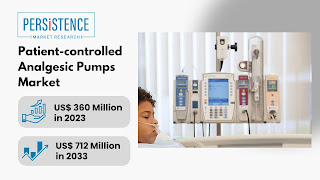Market Overview
Patient-controlled analgesic (PCA) pumps represent a crucial component in pain management, allowing patients to administer their own pain relief medication at their discretion within prescribed limits. This method provides autonomy, minimizes delays in pain relief, and aligns with individualized patient care. In the realm of modern medicine, managing pain effectively is paramount for ensuring patient comfort and recovery. Patient-controlled analgesic pumps (PCAPs) have emerged as a revolutionary solution in this regard, offering patients the ability to self-administer pain relief medication within safe limits, thereby empowering them in their own care. This article delves into the dynamics of the patient-controlled analgesic pumps market, offering a comprehensive size and growth analysis along with future projections.
Read More: https://www.persistencemarketresearch.com/market-research/patient-controlled-analgesic-pumps-market.asp
Understanding Patient-Controlled Analgesic Pumps
Patient-controlled analgesic pumps, also known as patient-controlled analgesia (PCA) pumps, are medical devices designed to deliver controlled doses of pain medication intravenously, subcutaneously, or epidurally. These devices allow patients to self-administer analgesics within predetermined parameters set by healthcare professionals, thereby providing them with a greater sense of autonomy in managing their pain.
The fundamental principle behind PCAPs is to enable patients to titrate their pain relief medication according to their individual needs, thereby minimizing the risk of under or over-medication. By putting the control in the hands of the patient, PCAPs not only enhance the overall patient experience but also contribute to more effective pain management outcomes.
The patient-controlled analgesic pumps market has witnessed significant growth in recent years, driven by several key factors. The rising prevalence of chronic pain conditions, increasing surgical procedures, and growing awareness regarding the benefits of PCAPs among healthcare providers and patients have all contributed to the expansion of the market.
Moreover, technological advancements in pump design and functionality, such as the integration of smart pumps with advanced monitoring and safety features, have further propelled market growth. These innovations have not only enhanced the safety and efficacy of PCAPs but have also expanded their applicability across a wide range of clinical settings.
Market Size and Growth Analysis
According to Persistence Market Research's projections, the global PCA pumps market is anticipated to grow steadily, with an estimated CAGR of 7.1%, increasing from a valuation of US$ 360 Million in 2023 to US$ 712 Million by 2033. The market growth can be attributed to several factors, including:
Increasing Surgical Procedures: The growing number of surgical procedures, particularly in fields such as orthopedics, oncology, and obstetrics, has significantly contributed to the demand for PCAPs. These devices play a crucial role in post-operative pain management, allowing patients to control their pain medication dosage effectively.
Rising Prevalence of Chronic Pain Conditions: Chronic pain conditions, such as arthritis, neuropathy, and fibromyalgia, affect millions of people worldwide, driving the demand for effective pain management solutions. PCAPs offer a non-invasive and patient-centered approach to pain relief, making them increasingly popular among individuals suffering from chronic pain.
Advancements in Pump Technology: Ongoing advancements in pump technology, including the development of compact and portable devices, integration of wireless connectivity for remote monitoring, and incorporation of intelligent algorithms for personalized dosing, are driving market growth. These technological innovations not only enhance the usability and safety of PCAPs but also open up new avenues for their application in home healthcare settings.
Growing Adoption of Ambulatory Care: The shift towards ambulatory care and outpatient settings has created a greater need for convenient and patient-friendly pain management solutions. PCAPs offer a viable alternative to traditional methods of pain relief, allowing patients to receive continuous analgesia while remaining mobile and active.
Future Projections
Looking ahead, the patient-controlled analgesic pumps market is poised for continued growth and innovation. Several trends are expected to shape the future trajectory of the market, including:
Expansion of Indications: With ongoing research and development efforts, the indications for PCAPs are expected to expand beyond acute and post-operative pain management to include chronic pain conditions and palliative care. This expansion of indications will further broaden the market potential for PCAPs.
Integration of Artificial Intelligence: The integration of artificial intelligence (AI) and machine learning algorithms into PCAPs holds the promise of personalized pain management solutions tailored to individual patient needs. AI-driven pumps can analyze real-time data, such as patient vital signs and pain scores, to optimize dosing regimens and minimize adverse effects.
Focus on Patient Experience: Patient-centricity will remain a key focus area for manufacturers and healthcare providers alike. Future PCAPs are likely to prioritize user-friendly design, intuitive interfaces, and enhanced safety features to improve the overall patient experience and adherence to therapy.
Shift towards Home Healthcare: As healthcare delivery continues to evolve, there will be a greater emphasis on shifting care from hospital settings to the home environment. PCAPs are well-suited for home use, offering patients greater flexibility and autonomy in managing their pain while reducing the burden on healthcare resources.
In conclusion, the patient-controlled analgesic pumps market presents significant opportunities for growth and innovation, driven by the increasing demand for effective pain management solutions and advancements in pump technology. By empowering patients to take control of their pain relief medication, PCAPs are reshaping the landscape of pain management and improving the quality of life for millions of individuals worldwide.

Comments
Post a Comment